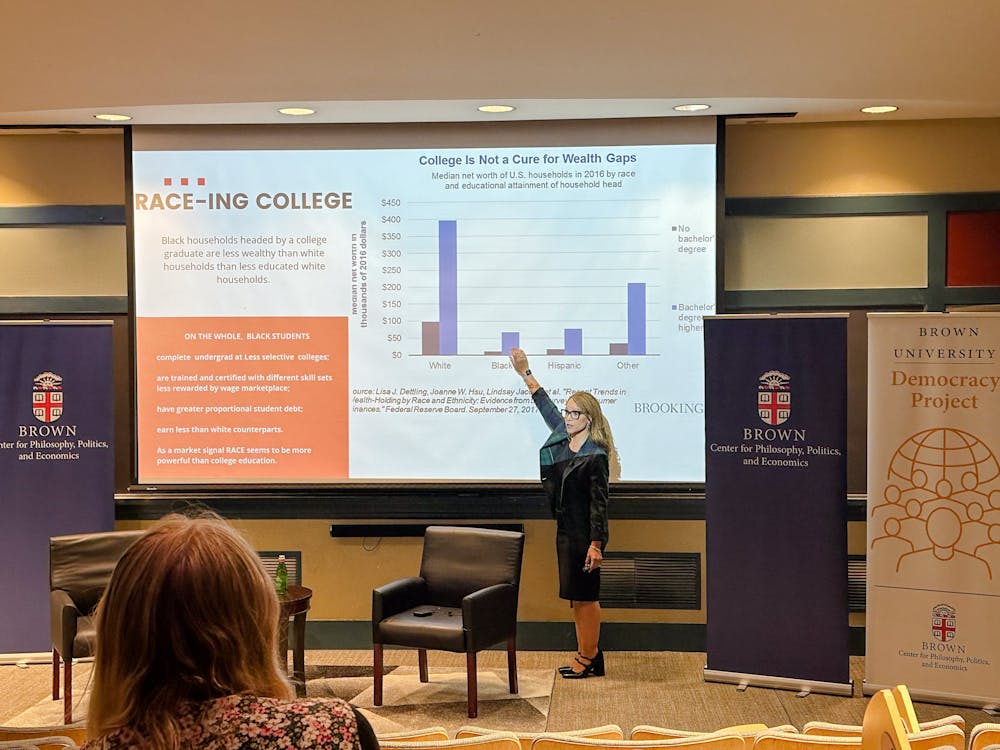Melissa Harris-Perry, professor at Wake Forest University and former MSNBC host, spoke about barriers in higher education at a Thursday lecture hosted by the Center for Philosophy, Politics and Economics.
Harris-Perry’s lecture, “Flags, Stairs and Folding Chairs: Marginalization and Strategies of Resistance in Higher Education,” addressed topics such as affirmative action and the value of higher education. The event was part of a programming series from the Democracy Project, a PPE-organized initiative focused on investigating democratic ideas and themes.
For Harris-Perry, the event’s title represents three types of resistance used by marginalized groups in higher education: flags represent presence, stairs represent “battle against existing structures” and folding chairs represent “collective engagement in the joy of victory and recognition.”
The reference to a folding chair invokes Shirley Chisholm’s famous quote, “If they don't give you a seat at the table, bring a folding chair,” Harris-Perry said in an interview with The Herald. It also references August’s viral “Montgomery Brawl,” where four white boaters attacked a Black riverboat crew member, Harris-Perry told the audience at her lecture.
Thursday’s lecture was Harris-Perry’s first time speaking publicly on the Supreme Court’s decision to place limits on race-based admissions in higher education over the summer. She noted that the decision might also reduce the representation of marginalized people in professional fields.
“If you're going to be a teacher, lawyer, physician, you have to ” go to college, she explained. “So when we say ‘Who deserves to be here?’ we are in part asking, ‘Who deserves to be represented in the classroom? Who deserves to be represented in the court? Who deserves to be represented in their medical care?’”
“If students don't get in, they cannot get out,” she added. “They cannot get past the gateway, full stop.”
Harris-Perry criticized the notion that many students are more qualified than others to attend selective schools. “Almost no 18-year-old is more worthy than another 18-year-old,” she said. “They can barely do laundry.”
Harris-Perry also addressed wealth disparities between Black and white college graduates.
“College doesn't have the economic returns that we might think that it has, especially for students of color,” Harris-Perry said.
But higher education is still valuable, she explained, recounting the story of her grandmother, Rosa, who once sacrificed heating in her home for the winter to afford her two sons’ education.
“College cannot just be about income,” Harris-Perry said. “I don't think that's why she was willing to be cold in the winter and I don't think that it is enough for us to explain or understand the democratic value of college education through how much money we earn.”
Instead, a college education is about “having a chance to… figure out who I am and what I think justice is,” she told The Herald.
Harris-Perry also commented on legacy admissions during the lecture, saying that “ending legacy would have a vastly negative effect on the Black middle class.”
“I enjoyed the fact that she wasn't afraid to go against some of the common things in academia, like her stance on legacy admissions,” said attendee Abigail Wahl ’27. “It was nice to see that perspective for sure.”
The lecture was “important and topical, especially amidst affirmative action and the political moment we're in,” said attendee Osiris Russell-Delano ’25. “It’s a lot to sit with, in terms of thinking about our places as students at an elite university like this.”

Elise Haulund is a science & research editor and sophomore from Redondo Beach, CA. Concentrating in English and biology, she has a passion for exploring the intersection between STEM and the humanities. Outside of writing, researching and editing, she enjoys ballet-dancing, cafe-hopping and bullet-journaling.





